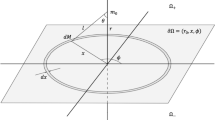Abstract
As is well known, the pressure of radiation, predicted by Maxwell, and since experimentally confirmed by Lebedew and by Nichols and Hull, plays an important part in the theory of radiation developed by Boltzmann and W. Wien. The existence of the pressure according to electromagnetic theory is easily demonstrated,1 but it does not appear to be generally remembered that it could have been deduced with some confidence from thermodynamical principles, even earlier than in the time of Maxwell. Such a deduction was, in fact, made by Bartoli in 1876, and constituted the foundation of Boltzmann's work.2 Bartoli method is quite sufficient for his purpose; but, mainly because it employs irreversible operations, it does not lend itself to further developments. It may therefore be of service to detail the elementary argument on the lines of Carnot, by which it appears that in the absence of a pressure of radiation it would be possible to raise heat from a lower to a higher temperature.
This is a preview of subscription content, access via your institution
Access options
Subscribe to this journal
Receive 51 print issues and online access
$199.00 per year
only $3.90 per issue
Buy this article
- Purchase on Springer Link
- Instant access to full article PDF
Prices may be subject to local taxes which are calculated during checkout
Similar content being viewed by others
Rights and permissions
About this article
Cite this article
RAYLEIGH The Pressure of Radiation and Carnot's Principle. Nature 92, 527–528 (1914). https://doi.org/10.1038/092527b0
Issue Date:
DOI: https://doi.org/10.1038/092527b0
Comments
By submitting a comment you agree to abide by our Terms and Community Guidelines. If you find something abusive or that does not comply with our terms or guidelines please flag it as inappropriate.


